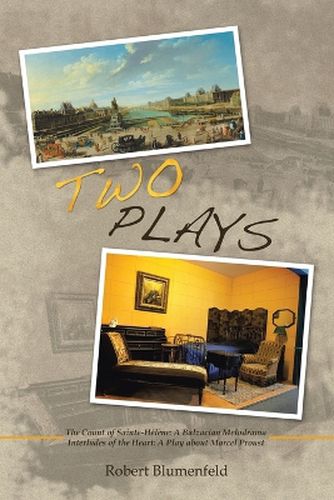Readings Newsletter
Become a Readings Member to make your shopping experience even easier.
Sign in or sign up for free!
You’re not far away from qualifying for FREE standard shipping within Australia
You’ve qualified for FREE standard shipping within Australia
The cart is loading…






This title is printed to order. This book may have been self-published. If so, we cannot guarantee the quality of the content. In the main most books will have gone through the editing process however some may not. We therefore suggest that you be aware of this before ordering this book. If in doubt check either the author or publisher’s details as we are unable to accept any returns unless they are faulty. Please contact us if you have any questions.
The Count of Sainte-Helene: A Balzacian Melodrama takes place in 1817-1818 in Paris, during the Bourbon Restoration when Louis XVIII had been placed on the throne of France at the decree of the Congress of Vienna after the defeat of Napoleon at Waterloo in 1815. This play is based on one of the most sensational cases solved by the first great detective in history, Eugene-Francois Vidocq, the ex-convict who became head of the French Surete (the Security Service of the French police). An altogether extraordinary individual, he was an acquaintance of Victor Hugo, who based both Jean Valjean and Inspector Javert in Les Miserables on Vidocq; and a friend of Balzac, whose character Vautrin is even more closely inspired by and modeled on Vidocq than Hugo's characters are. Interludes of the Hear: A Play about Marcel Proust, his life and loves, was inspired by my love for that author's most famous book, In Search of Lost Time. The play goes back and forth in time, as the Student interviews Celeste Albaret, Proust's housekeeper and general factotum, for his doctoral dissertation. When I read the book, I felt it was as if he were talking directly to me. I am sure many readers have had the same experience. Proust's penetrating picture of the society of his day in pre-World War One France, and of Paris during the war itself, and his amazing, psychologically insightful portrait of each of his characters, his understanding of psychology that in some ways parallels that of Sigmund Freud, makes his book still relevant in today's world.
$9.00 standard shipping within Australia
FREE standard shipping within Australia for orders over $100.00
Express & International shipping calculated at checkout
This title is printed to order. This book may have been self-published. If so, we cannot guarantee the quality of the content. In the main most books will have gone through the editing process however some may not. We therefore suggest that you be aware of this before ordering this book. If in doubt check either the author or publisher’s details as we are unable to accept any returns unless they are faulty. Please contact us if you have any questions.
The Count of Sainte-Helene: A Balzacian Melodrama takes place in 1817-1818 in Paris, during the Bourbon Restoration when Louis XVIII had been placed on the throne of France at the decree of the Congress of Vienna after the defeat of Napoleon at Waterloo in 1815. This play is based on one of the most sensational cases solved by the first great detective in history, Eugene-Francois Vidocq, the ex-convict who became head of the French Surete (the Security Service of the French police). An altogether extraordinary individual, he was an acquaintance of Victor Hugo, who based both Jean Valjean and Inspector Javert in Les Miserables on Vidocq; and a friend of Balzac, whose character Vautrin is even more closely inspired by and modeled on Vidocq than Hugo's characters are. Interludes of the Hear: A Play about Marcel Proust, his life and loves, was inspired by my love for that author's most famous book, In Search of Lost Time. The play goes back and forth in time, as the Student interviews Celeste Albaret, Proust's housekeeper and general factotum, for his doctoral dissertation. When I read the book, I felt it was as if he were talking directly to me. I am sure many readers have had the same experience. Proust's penetrating picture of the society of his day in pre-World War One France, and of Paris during the war itself, and his amazing, psychologically insightful portrait of each of his characters, his understanding of psychology that in some ways parallels that of Sigmund Freud, makes his book still relevant in today's world.